You Don’t Need to Thank Me for My Service. I Needed It More Than It Needed Me.
I’m proud of my service. Let me get that out of the way up front. But I don’t parade my service around. I don’t wear clothes that advertise it. There are no bumper stickers on my car. I rarely bring it up in conversation.
Most people are surprised when they learn I served. “You don’t look like any veteran I ever met,” they often say—whatever that means. Almost inevitably, that is followed up with “Thank you for your service.” I respond with a polite “thank you” and try to move on.
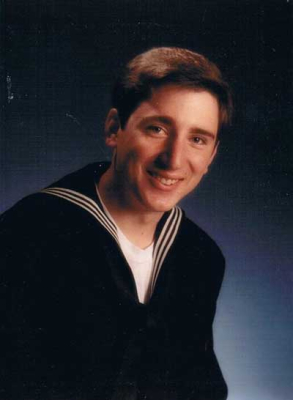
David Chetlain at the start of his Navy career. Photo courtesy of the author.
But you know what? You don’t need to thank me for my service. Yes, I served honorably. It was challenging, sometimes dangerous, and not always a lot of fun. But the truth is the Navy did far more for me than I ever did for it.
I grew up poor. Not just a little poor, but multigenerational, bottom-quintile poor. We subsisted on one or more forms of public assistance for most of my childhood. No one in my family had completed four years of college. Ever. My teachers urged me to go to college, but we had no money and I didn’t even know how to apply or find the funds if I did go. I also had a difficult situation at home—if I was ever going to get ahead in life, I needed to get out of that house and put it behind me.
At 17, I took the SAT and the Armed Services Vocational Aptitude Battery and did exceptionally well on both. No college recruiters called me, but I did hear from three military recruiters. I talked to all of them. I settled on the Navy’s Advanced Electronics Field the summer before my senior year. It felt good to know what I would be doing when I graduated.
I left for Naval Station Great Lakes five days after receiving my high school diploma and never looked back. I went from a world of chaos, poverty, and dysfunction to one of order, discipline, and regular meals. The Navy gave me the structure and consistency I needed in life.
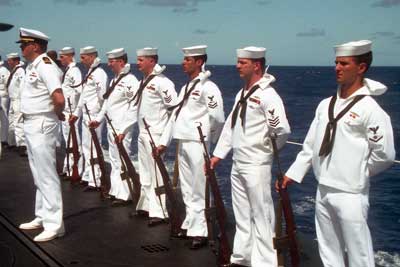
A burial at sea for Donald Ross on the USS Nevada SSBN 733. Ross was a Navy officer who received the first Medal of Honor of World War II for his actions during the attack on Pearl Harbor. Photo by Scott Reiger.
I hadn’t been a particularly motivated student in school. I rarely did my homework and didn’t see the point of most classes. Navy training was different. Everything I learned had a purpose, and I threw myself into it. I studied long hours into the night. I worked hard to be at the top of all my classes. When it was time to select orders for my first duty station, I chose first. This was a real transformation. I learned new habits. I developed the discipline to study, learn, and achieve.
Award-Winning Journalism in Your Inbox
Not everything was rosy. The first protestors I saw showed up outside Naval Station Great Lakes when I was still in electronics training. (This was the 1980s.) They showed up again outside Naval Submarine Base New London in Connecticut, then at Naval Submarine Base Bangor in Washington. The protesters were at my first duty station in Connecticut and at every port call. In Florida, they threw pig’s blood on our submarine and called us baby killers. When we pulled into Sitka, Alaska, unannounced, local protestors paddled around us in kayaks for hours. (Not one of them thanked me.)
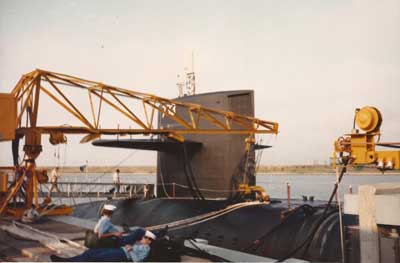
Protesters seemed to show up everywhere during David Chetlain’s time in the Navy in the 1980s and early 1990s. “In Florida,” he writes, “they threw pig’s blood on our submarine and called us baby killers.” Photo courtesy of the author.
In 1991, someone threw a Molotov cocktail at the recruiting station where I worked. Later, while I was assigned to a federal building in downtown Portland, protesters showed up regularly. I watched them from my fifth-floor window. None of them thanked me, either.
During all this time, I attended school at the Navy’s expense. I sucked up every educational opportunity I could find. Navy correspondence courses, Navy classroom training, college classes, writing classes, leadership training—you name it. I eventually accumulated enough credits to earn an associate’s degree. I made E-6 on my first try. My degree had put me over the top. But I didn’t stop there. I used Navy tuition assistance for night and weekend classes while in port. I eventually completed my bachelor’s degree on my own time and with a lot of the Navy’s money.
I used a Veteran Affairs loan to buy land and build my first house—at 22. Yet another life-changing opportunity courtesy of the Navy. While attending college, doing submarine duty, and dodging protesters, the world was changing. After the Gulf War came and went, America wanted to cash in on the “peace dividend.” I took an early discharge, got a job as a contractor for Microsoft, and never looked back. My post-military career took me all over the world. I’ve had opportunities and adventures my 17-year-old self never could have dreamed of. And it all happened because of the Navy.
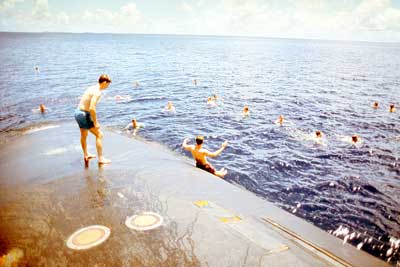
Naval service gave David Chetlain experiences he never could have imagined as a 17-year-old, including sliding off a submarine during a “swim call” in the Marshall Islands. Photo by Scott Reiger.
My service isn’t anything extraordinary. I did what was asked, and I did it well. I never served in a war zone (I spent the Gulf War on submarine patrol) and nobody ever shot at me, although I did occasionally think the Navy might kill me. It pushed me in ways I’d never been pushed. I missed holidays, birthdays, and Super Bowls. But I have no significant disabilities, outside of a caffeine addiction. I have no significant scars—not even a tattoo.
Not everyone has been so fortunate. Some gave their lives, like the shipmate I helplessly watched die in front of me. Others carry wounds, visible and invisible, and live with disabilities or injuries they will never recover from. These are the people who deserve our gratitude.
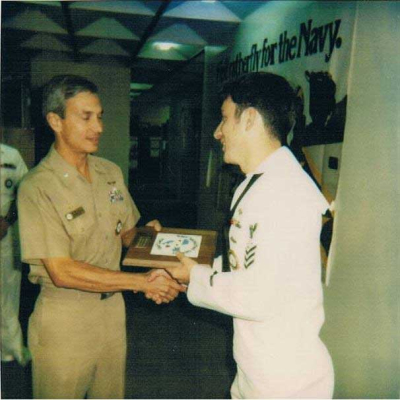
David Chetlain’s last day of active duty in the Navy. After the Gulf War, Chetlain was offered an early discharge—and took it. By then, he’d earned a college degree, something that had once felt out of reach. Photo courtesy of the author.
But if you really want to thank me for my service, here’s what you can do. Vote. Honor the Constitution, even the parts you don’t like. Donate time or money to an organization that supports veterans and active-duty service members who need it. Veterans of Foreign Wars, Disabled American Veterans, Fisher House, and The Navy-Marine Corps Relief Society are some of my favorites. Give a veteran a job. Volunteer in your community. Make the world a better place.
Or instead of saying thank you, just talk to a veteran. Ask them what they did while they were in. Ask them where they served, if they are glad they did, if they would do it again, and what they took from their experience. Ask how you can help veterans who may be in need.
Our Journalism Depends on Your Support
I joined the military because it was the best option for me. Sure, I wanted to serve my country—but that was a secondary motive. Some people claim that their recruiter “lied to them” or tricked them into enlisting. If anything, my recruiter undersold the experience. Serving in the United States Navy opened up a lifetime of opportunities and experiences. That is thanks enough.





Comments are closed.